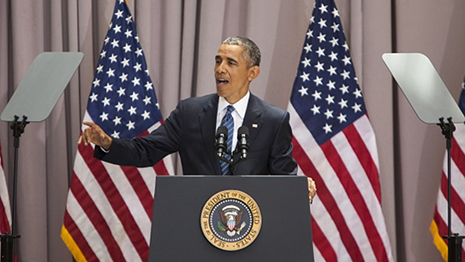A few examples:
"We have achieved a detailed arrangement that permanently prohibits Iran from obtaining a nuclear weapon." Actually, the deal`s restrictions end abruptly after 15 years, with some of the constraints on uranium enrichment fading away after just 10. Late in the speech, Obama made the case that much can change in a decade and that the West could be in a stronger position then to continue to block Iran`s nuclear desires. But the temporary nature of the deal remained disguised.
"Many of the same people who argued for the war in Iraq are now making the case against the Iran nuclear deal." Certainly the Iraq war was sold on spurious grounds and had tragic results. Certainly Republicans and Democrats alike were far too credulous in accepting the Bush administration`s rationale. But these facts have absolutely nothing to do with this agreement.
"Before the ink was even dry on this deal, before Congress even read it, a majority of Republicans declared their virulent opposition." That`s true, but ignores that opponents had plenty of time to study the draft agreement reached last spring. The real problem is that Congress still hasn`t read the entire accord, its side agreements and the inspections plan negotiated by the International Atomic Energy Agency. Even Secretary of State John Kerry says there are aspects of the deal he has never seen.
"If there is a reason for inspecting a suspicious undeclared site anywhere in Iran, inspectors will get that access even if Iran objects. This access can be with as little as 24 hours` notice." The key words here are "as little as." Iran can draw that process out for as long as 24 days if it so chooses. Foreign Minister Javad Zarif says some military sites will remain off-limits to IAEA personnel.
"If, as has also been suggested, we tried to maintain unilateral sanctions, beefen them up … we`d have to cut off countries like China from the American financial system. And since they happen to be major purchasers of our debt, such actions could trigger severe disruptions in our own economy, and, by way, raise questions internationally about the dollar`s role as the world`s reserve currency." Rejection by Congress could cause the sanctions regime to fray. Lawmakers should weigh this. The idea that it might cripple the U.S. economy is absurd.
"I`ve had to make a lot of tough calls as president, but whether or not this deal is good for American security is not one of those calls, it`s not even close." Maybe this deal is the best chance to delay the mullahs` race to the bomb and keep the Middle East out of a nuclear arms race. But the case is anything but open-and-shut. It`s hard to see what the president gains from denying this.
Well, perhaps one thing: Obama may hope that denigrating those who disagree with him will rally Democrats in Congress to support a veto of any measure of disapproval. Tactics aside, it would be far better to win this fight fairly. The pact is not a treaty: A future president and Congress might overturn it, arguing that it was sealed without proper consideration. And history often looks with disgust at causes built on fear, especially if they go awry. Obama wouldn`t want to face the kind of scorn he heaped on George W. Bush today.
AzVision.az
More about:
















































